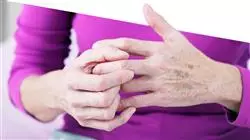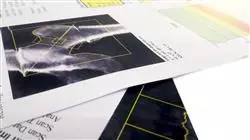University certificate
The world's largest faculty of medicine”
Introduction to the Program
A Postgraduate diploma of 450 teaching hours of update in pain management of the most frequent rheumatic pathologies"

From osteoarthritis, microcrystalline arthropathies, degenerative and traumatic pathologies to musculoskeletal infections may have a higher incidence in geriatric patients. The common nexus of all these diseases is the painful manifestation, which can facilitate their diagnosis and specific treatment.
The increase in the population affected by these conditions poses a challenge both in the techniques for their detection and evaluation and in their approach, especially in a population group that is characterized by being pharmacologically treated for previous pathologies. A scenario that puts Rheumatology specialists to the test, thus motivating the creation of this Postgraduate diplomaa in Rheumatic Pain in the Geriatric Patient.
This is an intensive program that will allow the graduate to deepen from an integral vision in the physiopathology of pain and the different therapeutic options and existing treatments for the improvement of the painful experience. In addition, during the 450 teaching hours of this training, you will delve into the most frequent musculoskeletal diseases and manifestations of systemic pathologies.
Likewise, thanks to the Relearning system, based on the reiteration of key concepts throughout the academic itinerary, students will be able to reduce the hours of memorization and consolidate the concepts addressed.
Undoubtedly, a unique opportunity to update through a university degree that facilitates self-management of study and access to the program at any time of the day, through a cell phone, tablet or computer with internet connection. An ideal academic option for medical professionals who are looking for a first class program, according to their needs.
A university degree that is compatible with your schedule and with your goals of updating your knowledge in Rheumatic Pain in the Geriatric Patient"
This Postgraduate diploma in Rheumatic Pain in the Geriatric Patient contains the most complete and up-to-date scientific program on the market. The most important features include:
- The development of practical cases presented by experts in Rheumatology
- The graphic, schematic, and practical contents with which they are created, provide scientific and practical information on the disciplines that are essential for professional practice
- Practical exercises where self-assessment can be used to improve learning
- Its special emphasis on innovative methodologies
- Theoretical lessons, questions to the expert, debate forums on controversial topics, and individual reflection assignments
- Content that is accessible from any fixed or portable device with an Internet connection
With this degree, it explores the most frequent fractures in the emergency and consultation of geriatric patients"
The program’s teaching staff includes professionals from sector who contribute their work experience to this educational program, as well as renowned specialists from leading societies and prestigious universities.
Its multimedia content, developed with the latest educational technology, will provide the professional with situated and contextual learning, i.e., a simulated environment that will provide an immersive education programmed to learn in real situations.
The design of this program focuses on Problem-Based Learning, by means of which the professional must try to solve the different professional practice situations that are presented throughout the academic course. For this purpose, the student will be assisted by an innovative interactive video system created by renowned experts.
Thanks to the Relearning method, you will be able to reduce the hours of study and consolidate the concepts covered in this degree"

An academic option that will take you from conventional radiography to nuclear medicine for the diagnosis of osteoarthritis"
Why study at TECH?
TECH is the world’s largest online university. With an impressive catalog of more than 14,000 university programs available in 11 languages, it is positioned as a leader in employability, with a 99% job placement rate. In addition, it relies on an enormous faculty of more than 6,000 professors of the highest international renown.

Study at the world's largest online university and guarantee your professional success. The future starts at TECH”
The world’s best online university according to FORBES
The prestigious Forbes magazine, specialized in business and finance, has highlighted TECH as “the world's best online university” This is what they have recently stated in an article in their digital edition in which they echo the success story of this institution, “thanks to the academic offer it provides, the selection of its teaching staff, and an innovative learning method aimed at educating the professionals of the future”
A revolutionary study method, a cutting-edge faculty and a practical focus: the key to TECH's success.
The most complete study plans on the university scene
TECH offers the most complete study plans on the university scene, with syllabuses that cover fundamental concepts and, at the same time, the main scientific advances in their specific scientific areas. In addition, these programs are continuously being updated to guarantee students the academic vanguard and the most in-demand professional skills. In this way, the university's qualifications provide its graduates with a significant advantage to propel their careers to success.
TECH offers the most comprehensive and intensive study plans on the current university scene.
A world-class teaching staff
TECH's teaching staff is made up of more than 6,000 professors with the highest international recognition. Professors, researchers and top executives of multinational companies, including Isaiah Covington, performance coach of the Boston Celtics; Magda Romanska, principal investigator at Harvard MetaLAB; Ignacio Wistumba, chairman of the department of translational molecular pathology at MD Anderson Cancer Center; and D.W. Pine, creative director of TIME magazine, among others.
Internationally renowned experts, specialized in different branches of Health, Technology, Communication and Business, form part of the TECH faculty.
A unique learning method
TECH is the first university to use Relearning in all its programs. It is the best online learning methodology, accredited with international teaching quality certifications, provided by prestigious educational agencies. In addition, this disruptive educational model is complemented with the “Case Method”, thereby setting up a unique online teaching strategy. Innovative teaching resources are also implemented, including detailed videos, infographics and interactive summaries.
TECH combines Relearning and the Case Method in all its university programs to guarantee excellent theoretical and practical learning, studying whenever and wherever you want.
The world's largest online university
TECH is the world’s largest online university. We are the largest educational institution, with the best and widest online educational catalog, one hundred percent online and covering the vast majority of areas of knowledge. We offer a large selection of our own degrees and accredited online undergraduate and postgraduate degrees. In total, more than 14,000 university degrees, in eleven different languages, make us the largest educational largest in the world.
TECH has the world's most extensive catalog of academic and official programs, available in more than 11 languages.
Google Premier Partner
The American technology giant has awarded TECH the Google Google Premier Partner badge. This award, which is only available to 3% of the world's companies, highlights the efficient, flexible and tailored experience that this university provides to students. The recognition as a Google Premier Partner not only accredits the maximum rigor, performance and investment in TECH's digital infrastructures, but also places this university as one of the world's leading technology companies.
Google has positioned TECH in the top 3% of the world's most important technology companies by awarding it its Google Premier Partner badge.
The official online university of the NBA
TECH is the official online university of the NBA. Thanks to our agreement with the biggest league in basketball, we offer our students exclusive university programs, as well as a wide variety of educational resources focused on the business of the league and other areas of the sports industry. Each program is made up of a uniquely designed syllabus and features exceptional guest hosts: professionals with a distinguished sports background who will offer their expertise on the most relevant topics.
TECH has been selected by the NBA, the world's top basketball league, as its official online university.
The top-rated university by its students
Students have positioned TECH as the world's top-rated university on the main review websites, with a highest rating of 4.9 out of 5, obtained from more than 1,000 reviews. These results consolidate TECH as the benchmark university institution at an international level, reflecting the excellence and positive impact of its educational model.” reflecting the excellence and positive impact of its educational model.”
TECH is the world’s top-rated university by its students.
Leaders in employability
TECH has managed to become the leading university in employability. 99% of its students obtain jobs in the academic field they have studied, within one year of completing any of the university's programs. A similar number achieve immediate career enhancement. All this thanks to a study methodology that bases its effectiveness on the acquisition of practical skills, which are absolutely necessary for professional development.
99% of TECH graduates find a job within a year of completing their studies.
Postgraduate Diploma in Rheumatic Pain in Geriatric Patients
Rheumatic pain is one of the most common pathologies in the geriatric population, and is one of the main causes of disability and loss of quality of life in these patients. At TECH Global University we have developed a program of Postgraduate Diploma in Rheumatic Pain in Geriatric Patients, with the aim of providing the healthcare professional with the necessary tools to diagnose and effectively treat this pathology in patients over 65 years of age. This postgraduate course is designed to deepen the knowledge of the different rheumatic diseases, their diagnosis and treatment, as well as strategies and techniques to control pain in the geriatric patient.
In this University Expert program, topics such as arthritis, osteoarthritis, osteoporosis and neuropathic pain, among other rheumatic pathologies, will be addressed. In addition, pharmacological and non-pharmacological treatment of pain, rehabilitation, interdisciplinary approach and prevention of complications related to the disease will be discussed. The aim is to train health professionals in the early detection of the pathology and in the implementation of preventive measures in geriatric patients. This postgraduate course is aimed at healthcare professionals from various disciplines who seek to broaden their training and specialize in the treatment of rheumatic pain in patients over 65 years of age.







